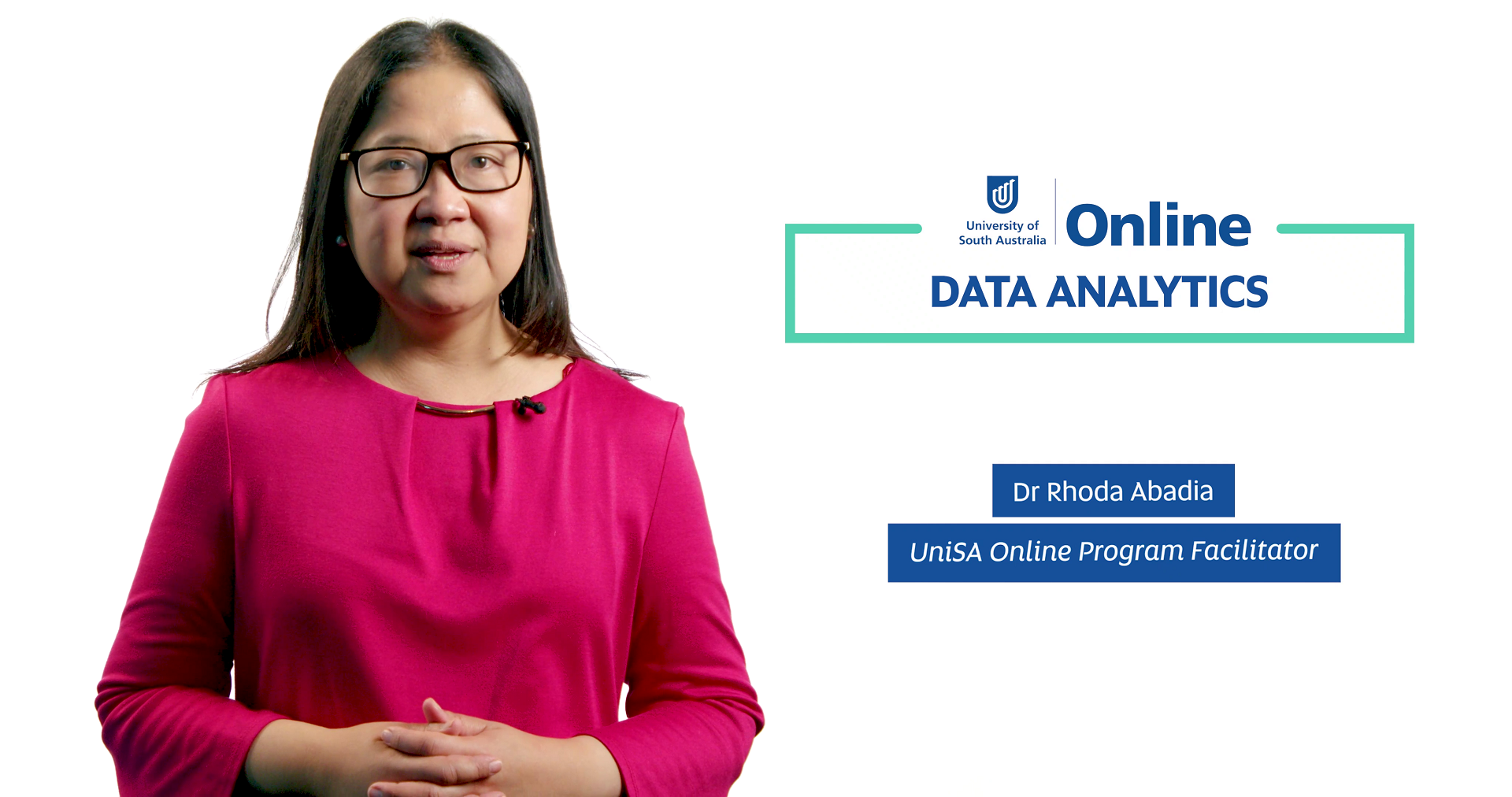You're viewing degree information for International students
You're an International student if you are:
- NOT an Australian or New Zealand citizen
- NOT an Australian Permanent Resident (including Permanent Humanitarian Visa holders)
Please remember your residency (the country you are currently in) has no impact on whether you are an Australian or International student.
UniSA Online degrees normally require international students to study outside of Australia. If you would like to study a UniSA Online degree within Australia, your visa conditions will need to allow online study. For advice on eligibility to study onshore in Australia, please contact us.
Bachelor of Data Analytics
Degree Level Undergraduate
Year 2025
-
View full entry requirements Hide full entry requirements
Entry requirements
Admission criteria
The admission criteria have been grouped to assist you to easily find the information most relevant to your circumstances. However, you may fit into more than one and the university will consider applicants against each of the relevant criteria.
Certain conditions apply. For more information refer to Appendix 4 of the University's Selection and Entry policy.
The admission criteria have been grouped to assist you to easily find the information most relevant to your circumstances. However, you may fit into more than one and the university will consider applicants against each of the relevant criteria.
Certain conditions apply. For more information refer to Appendix 4 of the University's Selection and Entry policy.
Applicants are required to meet one of the following criteria with a competitive result:Higher education study
- Successfully completed equivalent to a minimum of half a year of full-time study over a higher education program at a recognised higher education provider
OR
Vocational Education and Training (VET)
- Complete an award from a registered training organisation at Certificate IV or above
OR
Work and life experience (for domestic students only)
- Passed a UniSA Online literacy and numeracy test and have relevant work experience, or
- Completed a 12-month UniSA Foundation Studies program or equivalent, or
- Qualify for Special Entry
OR
Recent secondary education
- Completed a secondary education qualification equivalent to SACE, such as an interstate year 12 or international qualification
Essential requirements for admission
Prerequisites
NoneAssumed Knowledge
NoneEnglish language entry requirements
In addition to meeting academic entry requirements, international students who speak English as a second or additional language must also meet the University's English language entry requirements. The minimum language requirements for this program are:English language testPlease access the following link for a comprehensive list of English language tests accepted by UniSA and other important information in relation to meeting the University’s language requirements: English Language Equivalence Table (PDF)- IELTS total [6]
- IELTS reading [6]
- IELTS writing [6]
- IELTS speaking [6]
- IELTS listening [6]
Admission Requirements by Country
Bangladesh HSC 3.5 Canada High School (OSSD) 60 Eynesbury FSP 310 German Abitur 3.8 Kenya KCSE (average) B Malaysia STPM (best 3) 6 Malaysia UEC 32 Norway GPA 2.8 Pakistan HSSC 75 Sri Lanka A Levels (best 3) 6 Sweden GPA 12.5 UK Board GCE A Levels/HK Board 6 Vietnam 7 Australia 65 IB (best 6) 26 USA SAT (1600) 1050 India (best 4) State Board 70 India (best 4) Central Board 60 HKDSE 15 Nepal NEB 2.41
Degree overview
- Gain the skills to propel yourself into the booming field of data science.
- Understand the entire lifecycle of data including the main phases that define how information is created, gathered, processed, used, and analysed.
- Learn to analyse and visualise rich data sources and identify data trends, as well as generate data management strategies.
- Explore emerging topics such as cloud computing, machine learning, artificial intelligence, and text and social analytics.
- Perform predictive analytics on big data sets and become fluent in R and Python.
- Learn to use data visualisation tools as well as programs and techniques for data acquisition and data cleaning.
- Download data analytics software and tools used by industry professionals for free.
- Study course content co-developed by industry and expert academics.
Snapshot

Study On Demand – a 100% online data analytics degree designed specifically for online learning. Take full control over your study - access support seven days a week, plan your study to fit around your life, view learning resources 24/7, and log into the interactive online environment anywhere, any time and on any device.
UniSA Online’s data analytics degree is an opportunity to propel yourself into the booming field of data science. Employers are looking for people who can transform oceans of data into streams of meaningful insights to make better-informed decisions, drive business growth, and increase their competitive advantage. Through extensive industry consultation, we’ve designed a 100% online data analytics degree that covers emerging data trends and the latest developments in the field to ensure you graduate with a hyper-relevant skillset to enter the industry for the first time, or land a higher-level role.
Your data analytics courses explore the entire lifecycle of data including the main phases that define how information is created, gathered, processed, used, and analysed to achieve business goals. Explore different analytical methods, processes, tools and techniques used by data analysts. Learn key concepts including data visualisation, cloud computing, data mining and database administration, as well as foundational courses in programming, maths and stats at the start of your degree. Dive into more advanced topics in data visualisation, machine learning, artificial intelligence, text and social media analytics, and predictive analytics.
From every click, swipe, share, search, and stream, data is created at an extraordinary rate every second and is changing the way companies do business. Depending on what field you work in, data can be used to optimise digital marketing campaigns, develop new and innovative products and services, predict customer sales patterns, or increase productivity in areas such as sales and supply chain management.
Demand for data analysts is soaring, but there is a widening gap between the needs of organisations and the abilities of job candidates to fulfil those needs. Your UniSA Online data analytics degree is an opportunity to equip yourself with a powerful skill set that will make you highly competitive in the marketplace.
What you'll learn

Throughout your degree, you’ll study 10 data analytics-focused courses, seven IT-focused courses and three fundamental courses in maths and stats. At the start of your degree, you’ll cover key concepts in IT, programming, maths and stats, and foundation topics in data analytics before diving deeper into specialist data analytics courses in your second year. Towards the end of your studies, you’ll explore advanced topics in machine learning, artificial intelligence, text and social media analytics, data visualisation, and predictive analytics. For your capstone project, you’ll collaborate with an organisation on a real business challenge, using your skills to develop an approach to tackle a specific problem and deliver a solution for the client.
As cloud-hosted platforms and cloud solutions become part of modern analytics strategies, you must be armed with the most up-to-date knowledge. Learn about Amazon Web Services (AWS) and the AWS Global Cloud Infrastructure, as well as other cloud service offerings from Azure and Google Cloud.
Take a practical, hands-on approach to learning and download the latest software professionals use – for free. Become proficient at using commonly used open-source statistics packages such as the R language. Discover data visualisation software such as Tableau and advanced data platforms such as Snowflake’s Data Cloud, as well as other tools and techniques for data acquisition and cleaning.
As a graduate, you won’t just gain technical data analytics skills. You’ll develop strong communication skills that will prepare you to present clear ideas and important business decisions to both technical and non-technical stakeholders across all levels of an organisation.
Why Bachelor of Data Analytics

As the complexity and magnitude of data continue to grow, new data trends and insights are also evolving. At UniSA Online, we’ve specifically designed your data analytics courses in self-contained modules so that innovative and emerging data science topics can easily replace those that have become more mainstream.
You’ll be taught by experienced academics with expert knowledge in areas such as AI and machine learning, and you’ll study course content that has been co-developed with industry professionals and informed by the latest research in the field.
In a study that looked at the 10,000 Australian and New Zealand professionals listed on LinkedIn with the job titles ‘Data Scientist’ and ‘Data Analyst’, the most popular skills listed included programming languages such as SQL, Python, and R, business analysis, machine learning, visualisation tools such as Tableau and Microsoft PowerBI, as well as cloud technologies such as AWS, Google Cloud and Azure1. Your UniSA Online data analytics courses will ensure you leave job-ready with all these skills.
Study 100% online data analytics courses that have been designed with industry to meet common job requirements in roles such as data analysts, data scientists, business analysts, risk mitigation analyst and marketing analysts. You can be confident that what you’ll learn will directly translate into any data analysis-related profession, no matter where your career takes you.
1Data Science & Analytics – Market Snapshot and Salary Guide, Talent 2020.
Your career
The explosion in device connectivity and increasing data volumes, combined with the rise of the Internet of Things and the impact of social media, are all factors fuelling exponential growth in big data and data analytics. The digitisation of industries and the sheer volume of data being collected is not showing any signs of slowing. As businesses harness the power of data to remain competitive, demand for data analysts who can effectively extract, translate, visualise, and communicate information is soaring. The boom in big data, machine learning and artificial intelligence means demand is peaking for these specialists globally.
Data analytics is not just reserved for big tech giants. Traversing areas such as health, education, retail, telecommunications, financial services and management consulting, data analysts are needed in almost every industry, opening a world of opportunities for your career.
A UniSA Online Data Analytics degree can help you pursue the following careers:
-
Data analyst: Conduct pre and post-campaign analysis, identify targeting opportunities that support decision making across promotional campaigns; work with datasets or big data environments such as SQL Server, AWS Athena or Presto; demonstrate proficiency in Excel, SQL and scripting languages such as R or Python; create dashboards and data visualisations using tools such as Tableau or Microsoft PowerBI; design and drive analytical experiments and make recommendations based on results; communicate data insights to both analytical and non-analytical stakeholders.
-
Data scientist: Identify relevant data sources for business needs; collect and organise large amounts of data into usable formats; solve business-related problems using data-driven techniques; build predictive models and machine learning algorithms; work with a variety of programming languages including SAS, R and Python; keep-up-to-date with analytical trends and techniques such as machine learning and text analytics; generate insights from data sets and identify trends and patterns, and effectively communicate data findings to technical and non-technical audiences.
-
Business data strategist: Assess the most effective operating model and data approach to achieve business objectives; define and drive the enterprise-wide analytics vision across strategy, people, process, data and technology; and be heavily involved in business transformation, change and education needed to embed analytics into the organisational culture.
-
Data engineer: Develop new ways to store and access large amounts of data; design, build and test data architectures and tools that enable easier access and interpretation of data in a business context; develop, construct, test and maintain IT architectures such as databases and large-scale processing systems; gather, process and transform raw data from different sources and third parties; and extract data from systems to develop insights and recommendations that inform business decisions.
-
Data architect: Set up data platform technologies to manage and secure the flow of structured and unstructured data from multiple sources; create and maintain an optimal data pipeline architecture; develop reusable, maintainable and scalable data integrations and services; install and configure information systems; migrate data from legacy systems to new software solutions; design conceptional and logical data models and flowcharts; improve system performance by conducting tests and troubleshooting new elements.
-
Data visualisation specialist: Use visualisation tools and software to communicate information in different ways; present data in a way that is easy to understand, and spot patterns, trends and correlations; transform, improve and integrate data depending on business requirements; combine data sets across multiple sources; and deliver data in a useful and appealing way to users.
-
Information analyst: Provide advice, analysis and interpretation of data and information to key senior stakeholders; test security systems and identify potential problems that could cause security breaches in computer systems, mobile apps, and cloud software; write detailed risk reports if potential threats are discovered; develop security plans to protect system data; put up firewalls to guard data and protect systems from potential dangers; possess expert knowledge of the networking technologies within the organisation; demonstrate advanced programming skills in C, C+, and Java.
-
Reporting analyst: Analyse metrics and design reports to help drive critical business decisions; communicate results to senior stakeholders and provide recommendations based on the findings; design business analysts and data recording systems for the organisation; maintain databases and perform updates to ensure data accuracy; collect and analyse data for various types of business reports; monitor data to identify changes in financial and business trends.
Thinking of studying soon?
Industry facts
Enquire now to study with UniSA Online
Control how and when you study with our 100% online degrees.
Your study experience and support
Study On Demand
Our online career-focused degrees give you full control and ultimate flexibility over your study. It’s Study On Demand, on your schedule, on your terms.
- Designed specifically for your online learning
Designed by a team of academic and online experts, our course materials are delivered in an interactive way using innovative digital technology and state-of-the-art teaching and learning resources. - Study when it suits you
Our online degrees support students who lead busy lifestyles. With four start dates a year in January, March, July and September there is no need to interrupt your life. - Take control of your study schedule
With all content available from day one of your course, you have the power to plan your study schedule in advance. - Finish each course in 10 weeks
Our courses are delivered within 10-week terms to keep you motivated throughout your degree. Study two courses a term or just one. - 100% online study
You won’t need to come onto campus for coursework, assessments or exams. Complete all study for your degree where it suits you. - Get the help you need
Whether you need help with course content or assessments, we offer the academic support and services you need to be successful in your studies. - Adjust your study to your life
There’s no need to interrupt work and family life or spend money on travel and student accommodation. Organise study around your life. - Learn from world-renowned academics
Get a degree that’s designed and taught by leading academics and industry professionals. - 100% online interactive learning environment
Our interactive online learning environment supports all your study needs. Log in anytime, on any device, wherever it suits you. - Access a library of over 700,000 digital resources
Access a library of more than 700,000 digital resources including e-books, videos and journal articles. Our Ask the Library virtual service can help you locate, access, evaluate, use and reference a range of information resources.
What others are saying
IT Requirements
Generally, any desktop or laptop computer purchased in the past three years should be capable of meeting your online learning needs. While mobile devices such as tablets and smartphones will be able to access most of your online course content, there are likely to be elements of most courses where we recommend you use a desktop or laptop computer. Your computer should be able to:
- run a modern browser (Microsoft Edge, Firefox 24, Safari 5, or Chrome 32 or later versions)
- run Java
- run programs to create documents, spreadsheets and presentations
- use a web camera and headset (or ear pods with microphone)
- Some UniSA Online degrees require an online exam. The online exam software – Remote Proctor Now – has specific capability requirements. Please refer to the system requirements prior to conducting your exam to ensure your computer is compatible.
Access free IT software and resources
As a UniSA Online student, you'll:
- Get free access to the full Office 365 ProPlus suite, which includes full versions of Word, PowerPoint, Excel, Outlook, OneNote, Publisher, Access and Lync software. Install the full suite on up to five different devices (PC and Mac compatible).
- Get 1Tb of personal storage that syncs with your PC or mobile device through OneDrive - it's like an extra hard drive that allows you to open any of your files from any of your devices, whenever you need them.
- Get free access to LinkedIn Learning - Access more than 5000 video courses on a broad range of topics such as: the Microsoft Office suite, time management and study skills, health and wellbeing, communication and presentation skills, photography, film making and designing your own games or mobile apps.
- Be able to connect with others using Microsoft Teams, Yammer and the Outlook Web App.
There are some degrees that have specialised software requirements. We've made this software available to students to access for free - you'll be able to download and install any of the required programs on your own device anywhere and anytime. See if your degree requires specialised software.
Check your device
Our computer system test will determine if your device has the base system resources and software required to study online. It'll also check the speed of your internet connection.
See if your computer, laptop or device is all set up and ready to go – it takes just a few seconds.
The application process is easy – just follow these simple steps:
-
Submit an online enquiry
If you're ready to apply, the first step is to fill out and submit our online enquiry form. Here you'll be asked a series of questions to see if you're eligible. Following your online enquiry, one of our Degree Advisers will contact you at your preferred time to discuss the application process.
Enquire now > -
Speak to a Degree Adviser and start your application
If you're eligible, you'll receive an email outlining the entry requirements and the relevant documentation you need in order to be considered.
In order to verify your academic qualifications, you'll need to upload relevant documents like your official parchment, certificates or transcripts. If you have work experience, you will need to upload your CV as well as any other documents like work references, professional recognition or accreditation or your training certification.
Your email will contain information on the specific documents you need to provide as well as a link to begin your application. You'll be asked to create an account and set your own password.
-
Complete your application and send through your documents
In order to proceed with your conditional offer, you’ll need to complete your application and provide required evidence of your previous study or work experience.
Enquire now >
Alternative Pathways
Australian
There are other pathways you can follow to study this degree, including:
- UniSA College Diploma in STEM (Information Technology)
- UniSA College Undergraduate Certificate in University Studies (STEM)
- UniSA Online UniStart
-
When should I apply?
UniSA Online degrees start four times a year in January, April, June and September. There are key application dates for each term. If you're looking to apply for credit, there are different closing dates you need to be aware of, so it's always best to double check. Key dates can be found at unisaonline.edu.au/key-dates.
-
Do I have to be online at set times?
All of our courses are asynchronous, meaning you choose when to study, whenever it suits you. However, if your degree has online exams, you will need to sit these at a designated date and time. Some courses may also require you to speak to your academics via phone or online communication channels at a mutually agreed time as part of your assessment.
-
What academic support is available?
Our academics are available seven days a week, including weeknights. Throughout your degree, you’ll be supported by our highly experienced academic team of Online Course Facilitators and casual academics. Our teaching team will guide you through your learning and ensure you have an outstanding, high-quality education.
They can help you with your course materials and assessments, provide feedback on your work, assist you with referencing, and can answer any other course-specific queries.
You’ll be able to contact your academics via email, online discussion forums and live messages in the online learning environment. You can also communicate in real-time and chat face-to-face with your academics online.
If you need after-hours learning support, Studiosity is a great resource that can help you with your writing, academic language, grammar and referencing. You’ll also be able to chat online with a Studiosity online adviser.
-
How is my degree structured?
Full-time students study two courses each term. It makes earning a degree completely achievable, especially if you’re working. Your degree is delivered over four terms each year. Each term runs for ten weeks with two-week breaks in between each term.
You’ll also have the option to go part-time, or switch between the two. If you need to take a break in your study, that’s an option too. We recommend speaking to your Student Adviser who can help you update your study plan and check when your courses are offered.
-
What career prospects do I have with my university qualification?
Our degrees are designed in conjunction with industry experts, employers and professional associations, and informed by the latest developments in your field. You will graduate with in demand skills and up-to-date knowledge required by industry.
You will be studying with a university known for its employment outcomes. Your UniSA degree is more than just a piece of paper – it will prepare you to start your career, or take it to the next level. UniSA's online students have graduate employment rates well above the national average.*
UniSA Online qualifications follow the same Government Higher Education Standards Framework as our on-campus degrees. The parchment you receive at the end of your degree will be the same as any other University of South Australia student.
*UniSA External UG full-time employment rate 83% Graduate Outcomes Survey 2018
-
What are the main differences between online, on-campus and distance education?
The knowledge you gain from each mode of study is the same – it's how you get there that's different. When you study online, everything from your course material to weekly activities and assessments are fully online. You'll communicate with academic staff and students via live messages, online discussion forums and email.
Studying on campus requires students to physically come on to campus at specific times to attend lectures, tutorials and practicals. On-campus students have face-to-face contact with academics and fellow students and also communicate via email and online discussion boards.
Distance Education involves physical course material packages being sent to students, usually print based but occasionally audio or video. Communication is usually via telephone, mail and email. In today’s digital era, distance education has been superseded by online education.
More FAQs









